2013人教版必修二Unit 3《Computers》word学案
人教版高中英语必修2《Unit3Computers》教案
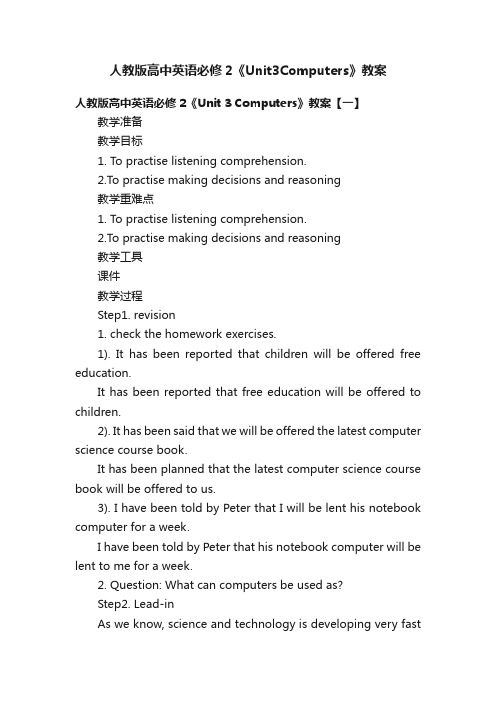
人教版高中英语必修2《Unit3Computers》教案人教版高中英语必修2《Unit 3 Computers》教案【一】教学准备教学目标1. To practise listening comprehension.2.To practise making decisions and reasoning教学重难点1. To practise listening comprehension.2.To practise making decisions and reasoning教学工具课件教学过程Step1. revision1. check the homework exercises.1). It has been reported that children will be offered free education.It has been reported that free education will be offered to children.2). It has been said that we will be offered the latest computer science course book.It has been planned that the latest computer science course book will be offered to us.3). I have been told by Peter that I will be lent his notebook computer for a week.I have been told by Peter that his notebook computer will be lent to me for a week.2. Question: What can computers be used as?Step2. Lead-inAs we know, science and technology is developing very fastand computers have become smaller and smaller. They have been used in many fields. So, the 21st century is the century of information technology What does it mean? Does information technology/ IT only mean things like computers? Of cause not. Actually, it means more than computers. Computers are just one kind of IT. What else do you know is part of IT?(TV, radio, CD-ROM, DVD, books……)Step3. Listening (SB)1. Pre-listening: What are the changes brought by different forms of IT ?What are the advantages and disadvantages of them ?2. While-listening:Go through the chart and make sure the students look at the chart before they listen to the tape. (This is to sharpen their attention and listen for the answers. This will also help them get the gist of the text.) Then Listen to the tape and finish filling in the chart. (If necessary, play the tape for several times.) Say: After listening to their talk, we know all kinds of IT have both disadvantages and advantages.Let’s check the answers together.Type of IT Advantages DisadvantagesTV You can both listen and watch. You cannot write to friends.Web You can find information. It is very expensive.Radio You can listen to English. You cannot watch a film.Book You can get information. Sometimes it is out of date.3. Post-listening:1) (pair work): decide which type of IT is best for you to use right now. Make your choice and give your reasons by using the following expressions.I think that….In my opinion, ….I believe that….I agree because….I disagree because….I’ve decided that….2) (group work): Discussion :Computers are useful and have brought us lots of good things, but they also cause bad effects. What attitude should we have towards the computer? (Make good use of it but never get trapped by it.)Step4. Speaking1. Pre-speakingSay: From what we have learn, we should admit that computers and the web have a great influence on the school education as well as people’s life. It has come into people’s everyday life and many families hold computers in their homes. Now there is a task for you.2. While-speaking1) Situation: You have been asked by your parents to help choose computers for your home. You and your friend have looked at several computers. Talk about the special things each computer can do. Make a decision about which kind of computer to buy and explain why.Information input: Show students some pictures of different computers (desktop computer & laptop computer & …) Language input: Useful expressions (Repeat it to strengthen students’ ability of use it.)Supporting an opinion Challenging an opinionI think that … , because … Perhaps, but what if / about …?First, … Have you thought about …?One reason is that … What makes you think that …?I think it is better because… I don’t like it because….(Pair work )Use the expressions to support your opinion or challenging other’s opinions.2) Oral report: (individual work )Do an oral report to your father and start your report like this: I looked at many different computers. The one I have chosen is the PEP personal computer. One of the main reasons is that it is suitable for homes. I found that…3. Post-speakingConclusion—What useful expression do we use to make a decision and reason?(In this way, they can review and use the words and phrases again.)Step6 Pre-writingSay: Imagine what problems and delights this android might have to deal with while it is serving you. Try yourself in someone else’s shoes is an important way of understanding how other people feel.Then discuss: You are an android. You work for a family with one child who is very spoiled. The parents want you to do everything for them. The parents are nice, but they often ask you to watch over their child. How do you feel? What would you do if the child asked you to do his/her homework for him/her? Would you ever tell the chi ld “no”?Step7 WritingSay: Write a passage about the result of your discussion! It should contain:What do you have to do?What is the child like?What is the parents’ requirement of the child?What do the parents want you to do?What does the child want you to do?Then what will you do? How do you feel?Sample writing:Hello everybody, my name is Liu Yan.I am a 321 model android.I work for the Li family. Mr and Mrs Li work very hard too.Mr Li is an architect and designs great tall apartment blocks.Mrs Li is a doctor and has to look after many patients.I remember all the plans for Mr Li's projects and can tell Mrs Li which drugs are the best to give any particular patient. And I also look after their library. I store all the books that they borrow from their school or friends in my brain.Of course my brain is as large as a mountain, so work like that is no trouble to me.I really eat books just like people eat food.The Lis have a child who is very spoiled. He needs me to remember all his school textbooks so that I can do his homework for him.He just gives me the information on the subject, what has to be done and the page numbers and I get on with it while he enjoys himself with his friends.Sometimes I don't think it is right to do his homework for him — it's somewhat cheating. However, his parents are very concerned at the pressure of work in school these days.The child has too much homework to do. They like him to go to the key school but they also want him to be able to have hobbies, learn to swim and keep fit! Poor child!So they consider me the most important person in the family after themselves.I am always introduced to their friends and play with visiting children.I am the perfect family academic aid and, although I was not cheap to buy, Mr Li says I was worth every yuan!Step8 AssessmentGet the students to assess their writing ability according to the following the questions:1. Is your composition well developed?2. Are your ideas well organized to the point?3. Do you have a good choice of words and idioms in your writing?4. Do you get a good mastery of complex structures of language?5. What kind of mistakes have you made in your writing?Step9: HomeworkWrite about your discussion. You may begin like this:Hello, everyone. My name is ___. I’m 321 m odel android. I work for the Li family….课后小结学了这节课,你有什么收获?课后习题完成课后习题一、二。
高中英语人教版必修2+Unit+3+Computers+period+1+教案.doc

新课标高中英语必修2 Unit 3 Computer 全单元教案M2 Unit 3 ComputerPeriod 1:Warmin/g up(WHO AM I?)Warming upThis section is an introduction to the topic.It is to get the students thinking about the different ways computers can be made.Do this part of the lesson in pairs and as a speaking activity.Warming up by talking about computerLook at the pictures on page 17. What are they? What do they have in common? Yes, they are computers. Then what is a computer?A computer is a machine which stores knowledge in its memory and does calculations on that knowledge. This knowledge is stored in symbols; it is called data.A computer usually has a monitor to show results. However, some computers can speak; these computers can be used for voice mail.Draw on the blackboard a diagram to illustrate the influence of the computer and the Internet over the school education.Below is a diagram you may like to use.Ask students to look at the diagram and consider, ”What changes have computers and the Internet brought to schools? What changes will they bring to schools in the future?”Ask the Ss to work in groups and to make a list of the possible changes they can think of.When most of the groups have their lists ready, the teacher can hold a class discussion.Write down the major changes the students think of under / beside the diagram.The teacher can add one or two changes that may affect their own teaching.For example, “Computers and the Internet can help busy parents contact teachers by email.”The teacher can end the task with a brief s ummary, or hold a further discussion to find out students' personal opinions about the changes.For example, ask them, “Do you like all these changes? Why and why not? What changes do you like / dislike?”Some information:计算机室A computer frequently requires a boot device. The boot device contains the computer’s operating system and data. Computer programs can be installed onto a computer. Some people think that computers are less useful if they do not have access to the Internet. They think this because the Internet allows the computers to send and receive data and email across the world.曙光3000巨型计算机A computer is now almost always an electronic device. It usually contains materials which are toxic; these materials will become toxic waste when disposed of. When a new computer is purchased in some places, laws require that the cost of its waste management must also be paid for. This is called product stewardship.In some countries old computers are recycled (melted down) to get gold and other metals. This is dangerous, because this procedure releases the toxic waste into the water and soil.Computers become obsolete quickly. Very often they are given away and new ones replace them within two or three years. This makes the problem worse. Computer recycling is thus common. Many projects try to send working computers to developing nations so they can be re-used and will not become waste as quickly. Computer jargon 计算机行话Computer jargon means words to do with computers and surrounding topics. Knowing what these words mean can help you know more about computers. Some people use these words to impress other people (Also known as buzzwords). Examples of jargon:Bit - The smallest data unit, can either be a “0.” or a “1.”.Byte - unit of data. See also Kilobyte, Megabyte, Gigabyte and NibbleCPU –Central Processing Unit, Another name for processorData - Information stored on a computerDisk - A place to store data.Email - Electronic mail.GHz - Gigahertz. Used often incorrectly to describe the speed of a processor. But with some 2.4 GHz processors faster than 3.6 GHz ones, it is clear that it is just a salesman trick.Load - Get data from a diskNibble - Half a ByteSave - Put data on a diskRAM – random-access memory(随机存取存储器), the more the better.USB - Universal Serial Bus(通用串行总线,一种简化了插接多种附件的薄型插座)WWW - World Wide Web, part of the InternetPeriod2-3 Pre-reading & ReadingPre-readingThis can be a continuation of the Warming Up.Let the students discuss the questions set out in the Student's Book.1. Questioning and answering What do you know about computer?●Electronic machine capable of performing calculations and other manipulations of various types of data, under the control of a stored set of instructions. The machine itself is the hardware; the instructions are the program or software. Depending upon size, computers are called mainframes, minicomputers, and microcomputers. Microcomputers include desk-top and portable personal computers.●A multi-function electronic device that can execute instructions to perform a task.●A device that accepts information, processes it, and supplies an output. A computer usually contains memory, a control unit, arithmetic and logical units, and a means for input and output.●a programmable har dware component that is controlled by internally stored programs and that can perform substantial computations (including arithmetic and logic operations) without human intervention. A computer typically consists of one or more processing units, memory units, and associated peripheral input and output devices.●Related to automation and electronic data processing. The Library of Congress commonly classes most computer-related books in HF5548, QA75-76, Z52, T385, and some TK ranges.●a machine for performi ng calculations automaticallycalculator: an expert at calculation (or at operating calculating machines)●A computer is a device or machine for making calculations or controlling operations that are expressible in numerical or logical terms. Computers are constructed from components that perform simple well-defined functions. The complex interactions of these components endow computers with the ability to process information. If correctly configured (usually by, programming) a computer can be made to represent some aspect of a problem or part of a system. If a computer configured in this way is give2. Discussing and sharing How have computers changed our lives?Someday soon, if you haven’t already, you’re likely to plug into the computer network nation growing in our midst. Computer terminals, or small computers connected via modem (a modulator/demodulator circuit for encoding/decoding computer chatter) to ordinary telephone lines, should be as ubiquitous as the telephone itself. They’re a much more use ful and humane tool than the phone, and with corporate America behind them the networks will be everywhere----changing our lives more than any technology since the automobile.Joining a computer network is the same as joining a community. Small systems are like villages, where new members are formally welcomed. The larger networks, the Source and CompuServe, for example, are cities-anonymous, full of life and events, but difficult to fit into.II. ReadingThis is the purpose of the reading and so it is important that the students learn to use all the clues in the text to help them understand the gist of what they are reading.So encourage them to look at the pictures and the heading and guess what the text might be about.Then ask the class to read the passage silently.Make sure the students have the chronology of the development of computers in their minds.Ask them:1. Listening and reading to the recording of the text WHO AM I?Turn to page 18 and listen and read to the recording of the text. Pay attention to the pauses, pronunciation and intonation of the native reader.2. Reading aloud and underlining expressionsNow we are to read the text once again and underline all the expressions in the text. Put them down into your notebook after class as homework.Collocations from WHO AM I?begin as…, a calculating machine, be built as…, follow instructions from…, sound simple, at the time, a technological revolution, write a book, make…work, solve problems, become huge, had artificial intelligence, go back t o…, the size of…, go by, change size, become small and thin, get quick, stand there by oneself, be connected by…, share information by…, talk to…, bring…into…, deal with…, communicate with…, serve the human race3. Reading, identifying and settlingAttention, please! It is time to skim the text one more time and identify the difficult sentences. Try analyzing the structures of the difficult sentences and discuss them among your group members. You may also put your questions to me for help.Chat (online)(在线)聊天To chat is to talk about ordinary things that are not very important. You can chat to one person or to many people. People also use this word now for parts of the Internet where we can talk with many different people at the same time. Usually, you chat on the internet in a chat room or messaging service like AOL(American On-Line) Instant Messenger (AIM), Yahoo Messenger, or MSN Messenger.IV. Closing down by doing comprehending exercisesTurn to page 18 and in pairs do the comprehending exercises No. 1 and 2. Reading and transferringScan the text for information to complete the table below, describing the development of computer.In 1642In 1822In 1936In 1960sIn 1970sAnswer key:1642: The computer began as a calculating machine.1822: The Analytical Machine was made by Charles Babbage.1936: Alan Turing wrote a book to describe how computers could be made to work.1960s: Computers had new transistors and became smaller.1960s: The first family of computers connected to each other.1970s: Computers were brought into people's homes.Now: Computers connect people all over the world togetherV. Explanation1.in common: for or by all of a group 共同的;共有的;共用的。
人教新课标高中英语必修二Unit 3 Computers导学案
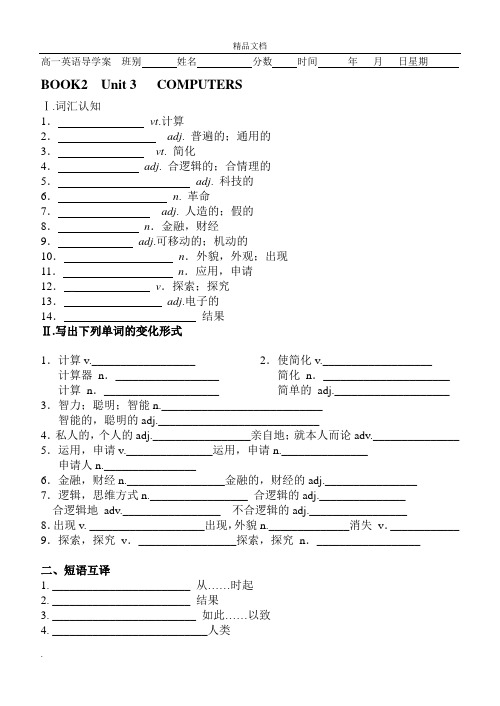
高一英语导学案班别姓名分数时间年月日星期BOOK2 Unit 3 COMPUTERSⅠ.词汇认知1.vt.计算2.adj. 普遍的;通用的3.vt. 简化4.adj. 合逻辑的;合情理的5.adj. 科技的6.n. 革命7.adj. 人造的;假的8.n.金融,财经9.adj.可移动的;机动的10.n.外貌,外观;出现11.n.应用,申请12._ v.探索;探究13.adj.电子的14.结果Ⅱ.写出下列单词的变化形式1.计算v.__________________ 计算器n.__________________ 计算n.____________________ 2.使简化v.___________________ 简化n.______________________ 简单的adj.____________________3.智力;聪明;智能n.____________________________智能的,聪明的adj.____________________________4.私人的,个人的adj._________________亲自地;就本人而论adv._______________ 5.运用,申请v._______________运用,申请n._______________申请人n.________________6.金融,财经n._________________金融的,财经的adj.________________7.逻辑,思维方式n._________________ 合逻辑的adj._______________ 合逻辑地adv._________________ 不合逻辑的adj._________________8.出现v. ____________________出现,外貌n.______________消失v.____________ 9.探索,探究v._________________探索,探究n.__________________二、短语互译1. ________________________ 从……时起2. ________________________ 结果3. _________________________ 如此……以致4. ___________________________人类5. __________________________ 在某种程度上6. __________________________ 在…… 帮助下7. __________________________ 处理;安排;对付8. __________________________ 看守;监视9. ___________________________虚构;化妆;组成,弥补10.___________________________ 共同的,共有的Ⅲ. 单句语法填空1.He was _______________very happy when he ____________________(real) hisdream to win the game.2.Misunderstandings __________________ (arise) from lack of social communication,unless ________________ (handle) properly, may lead to serious problems.3.__________________ (person) speaking, I am satisfied with all the work you havedone.4.This question is too difficult for the children. I think we’d better find a way to_________________ (simple) it.5.After the failure of the _________________ (operate), the doctor felt guilty andresigned.6.There is another kind of beauty that has nothing to do with __________________(appear), but comes from the heart.7.The ability to give good advice at the right time involves a great deal of________________(intelligent).8.I was ______________(total) confused by what she said.9. They agreed to accept my ___________________ (apply) for joining their team.10. _______________ (real) is not the way you wish things to be but the way theyactually are.11. His speech is _________________ (logical) organized and sounds great.12. I disagree that the age of ____________________ (technology) revolution has ended. III. 用适当的介词填空。
人教版高中英语必修二Unit 3《Computers》word学案
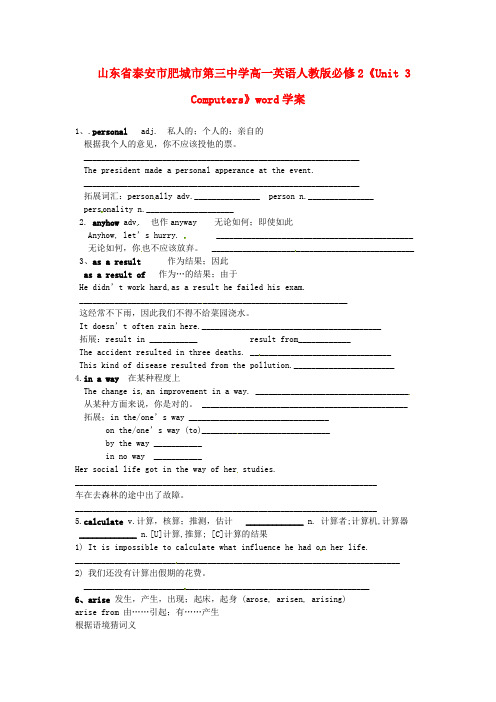
山东省泰安市肥城市第三中学高一英语人教版必修2《Unit 3Computers》word学案1、.personal adj. 私人的;个人的;亲自的根据我个人的意见,你不应该投他的票。
_______________________________________________________________The president made a personal apperance at the event._______________________________________________________________拓展词汇:person ally adv._______________ person n._______________pers onality n.____________________2. anyhow adv. 也作anyway 无论如何;即使如此Anyhow, let’s hurry. _____________________________________________ 无论如何,你也不应该放弃。
______________________________________________ 3、as a result 作为结果;因此as a result of 作为…的结果;由于He didn’t work hard,as a result he failed his exam._____________________________________________________________这经常不下雨,因此我们不得不给菜园浇水。
It doesn’t often rain here._________________________________________拓展:result in ___________ result from____________The accident resulted in three deaths. ________________________________This kind of disease resulted from the pollution._______________________4.in a way 在某种程度上The change is an improvement in a way. ___________________________________ 从某种方面来说,你是对的。
高级中学高中英语(人教版)必修二学案:Unit 3 Computers教学案
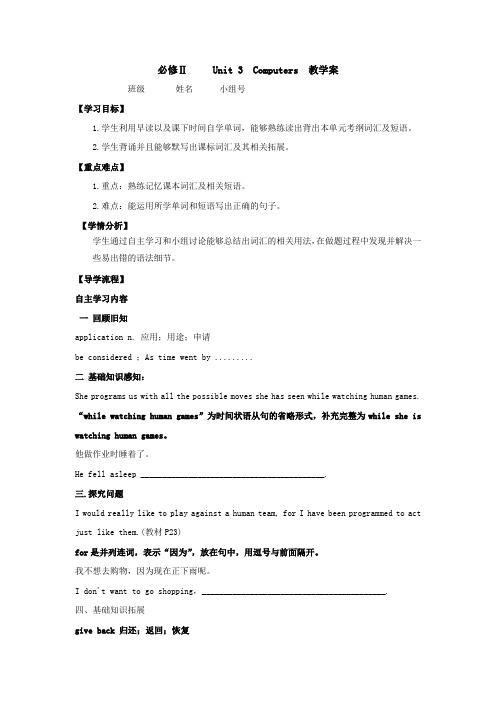
必修Ⅱ Unit 3 Computers 教学案班级姓名小组号【学习目标】1.学生利用早读以及课下时间自学单词,能够熟练读出背出本单元考纲词汇及短语。
2.学生背诵并且能够默写出课标词汇及其相关拓展。
【重点难点】1.重点:熟练记忆课本词汇及相关短语。
2.难点:能运用所学单词和短语写出正确的句子。
【学情分析】学生通过自主学习和小组讨论能够总结出词汇的相关用法,在做题过程中发现并解决一些易出错的语法细节。
【导学流程】自主学习内容一回顾旧知application n. 应用;用途;申请be considered ;As time went by .........二基础知识感知:She programs us with all the possible moves she has seen while watching human games. “while watching human games”为时间状语从句的省略形式,补充完整为while she is watching human games。
他做作业时睡着了。
He fell asleep __________________________________________.三.探究问题I would really like to play against a human team, for I have been programmed to act just like them.(教材P23)for是并列连词,表示“因为”,放在句中,用逗号与前面隔开。
我不想去购物,因为现在正下雨呢。
I don't want to go shopping,__________________________________________.四、基础知识拓展give back 归还;返回;恢复give away 捐赠;赠送;分送;颁发;泄露;暴露give in 呈交;屈服;让步give out 分发;耗尽;公布,宣布;发出(光、热或信号)give up 放弃;投降give way to 让……先行;被……代替与迁移:请及时记录自主学习过程中的疑难:小组讨论问题预设:(1)in a way=in one way在某种程度上(2)相关短语:in the/one's way 妨碍;挡道in this/that way 用这种/那种方式in no way 绝不on the/one's way 在路上;即将到来by the way 顺便说/问一下①The rainy weather helped me in___________way, which gave me a good excuse to refuse to go to this party or that.②There was a big truck in___________ way.提问展示问题预设:课文中的知识点及重难点词汇短语课堂训练问题预设:①The headmaster____________________the prizes at the school sports day.校长在校运动会那天颁发了奖项。
2013人教版必修二Unit 3《Computers》word教案

河北省康保一中英语组高一年级集体备课教案主备课人: 殷桂雁参加人:王培珍杨静慧安秀云马艳丽郝康李纬周燕娜备课时间:2010年11 月17日知识目标:Topic:Information technology ; history and basic knowledge of computers; robotsNew words: calculate universal, simplify, sum, operator, logical, logically, technology revolution artificial intelligence intelligent solve reality personal personally tube total totally network web application finance mobile rocket explore anyhow goal happiness download virus signal type coach arise electronic appearance character mop nicePhrases; from…on as a result so...that human race in a way with the help of deal with watch overSentence patterns ;1 making decisionsI think /I don’t think that…I believe that…I’ve decided that…Let’s decide…let’s make a decision2 ReasoningThe advantage/disadvantage is …I agree/don’t agree…because…Give me your reasons:First……second.What makes you think so?As/since……,I think……Grammar :现在完成时态被动语态的建构和用法Over time I have been changed quite a lot.First as a PC and then as a laptop , I have been used in offices and hones since the 1970sSince the 1970s many new applications have been found for meI have also been put into robots and used to make mobile phones as well as help with medical operations能力目标:让学生学习用英语表达自己的观点并进行简单的理由阐述及做出决定,并能按时间先后顺序来描述某事。
高中英语Unit3Computers教案新人教版必修2

Unit 3 Computers类别 话题词汇词组、 短语功能语法随堂练习教学目的和要求〔〕Information technologyhistory and basic knowledge of computers robotscalculate calculator PC notebook common analytical simple simple-minded technology technological revolution universal mathematical artificial intelligence anyway totally network truly race birth IT advantage disadvantage type disagree choice material personally create coach move arise brain mop wanderin common in one ’s opin ion go by so ... that ... deal with humanrace in a way make up with the help of after all watch over1. 做出决定〔 Making decisions〕I think that ... In my opinion ... I believe that ...Let ’ s make our decision.I ’ ve decided that ...2. 推理〔 Reasoning 〕The advantage/disadvantage is ...What ’s your reason? Why do you think so?I think this one is better because ...I don ’t like this one because ...现在完成时的被动语态结构和用法I have been made smaller and smaller.I have been used by millions of people.I have truly been built to help the human race.1、 Go over the story and discuss with your partner who the speaker is in thisstory.Now write down three sentences from the story to support your idea. It is a computer because it describes :Itselfas the analyticalmachine designed by CharlesBabbage 〔 which was the firstdesign of a computer 〕. Then in 1822 I was builtas an AnalyticalMachine by CharlesBabbage.Alan Turing as its real father 〔 and he designed thefirstreal computer 〕 . “ Myreal father was Alan Turing ...〞Having artificial intelligence〔 which only computers have 〕 . People have naturalintelligence.“ However, people thoughtI was simple-mindeduntilthey discoveredI had ‘artificial intelligence’ . 〞课程标准要求掌握的工程 ;Teaching aims and demands2、 Look at the timeline below.Fillin the blanks with information from the reading above.Timeline1642: The computer began as a calculating machine.1822: The Analytical Machine was made by Charles Babbage.1936: Alan Turing wrote a book to describe how computers could be made.1960s:Computers had new transistors and became smaller.1960s:The first family of computers was connected to each other.1970s:Computers were brought into people’ s homes.Now: Computers connect people all over the world together.课堂笔记1、 I know this sounds very simple,but at that time it was a technological revolution.我知道这听起来很简单,但是在那个时候这却是一项技术革命。
(人教版)必修二Unit3computers学案 -教学文档
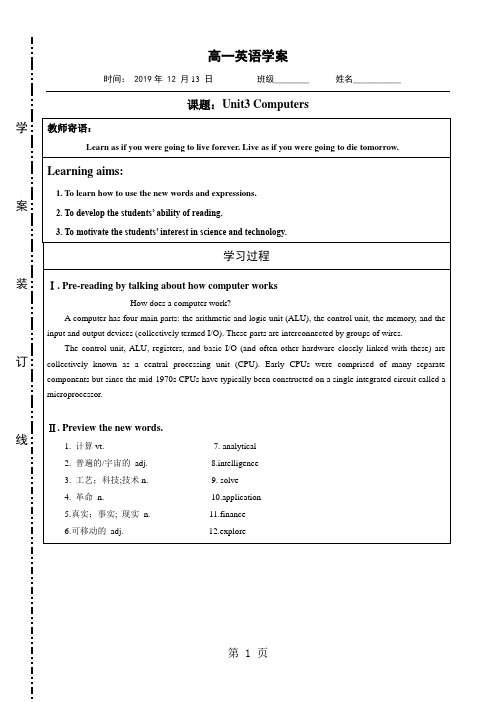
5.真实;事实;现实n. _______ 11.finance ______________
6.可移动的adj. _____________ 12.explore_______________
Ⅲ. During-reading
Ⅱ. Preview the new words.
1.计算vt. _________________ 7. analytical ____________
2.普________
3.工艺;科技;技术n. ________ 9. solve ______________
The control unit, ALU, registers, and basic I/O (and often other hardware closely linked with these) are collectively known as a central processing unit (CPU). Early CPUs were comprised of many separate components but since the mid-1970s CPUs have typically been constructed on a single integrated circuit called a microprocessor.
要练说,得练听。听是说的前提,听得准确,才有条件正确模仿,才能不断地掌握高一级水平的语言。我在教学中,注意听说结合,训练幼儿听的能力,课堂上,我特别重视教师的语言,我对幼儿说话,注意声音清楚,高低起伏,抑扬有致,富有吸引力,这样能引起幼儿的注意。当我发现有的幼儿不专心听别人发言时,就随时表扬那些静听的幼儿,或是让他重复别人说过的内容,抓住教育时机,要求他们专心听,用心记。平时我还通过各种趣味活动,培养幼儿边听边记,边听边想,边听边说的能力,如听词对词,听词句说意思,听句子辩正误,听故事讲述故事,听谜语猜谜底,听智力故事,动脑筋,出主意,听儿歌上句,接儿歌下句等,这样幼儿学得生动活泼,轻松愉快,既训练了听的能力,强化了记忆,又发展了思维,为说打下了基础。 课题:Unit3 Computers
- 1、下载文档前请自行甄别文档内容的完整性,平台不提供额外的编辑、内容补充、找答案等附加服务。
- 2、"仅部分预览"的文档,不可在线预览部分如存在完整性等问题,可反馈申请退款(可完整预览的文档不适用该条件!)。
- 3、如文档侵犯您的权益,请联系客服反馈,我们会尽快为您处理(人工客服工作时间:9:00-18:30)。
必修二unit 3 computers学案一.词性转换1. simplify vt. __________ adj __________ adv2.operator n. ___________v. ________ n.3. solve vt. ____________n.4. explore v._______________ n. _________________ n.5. reality n. ____________ vt. _____________ adj. ____________adv.6. application n. _____________ v. __________ adj.7. finance n. _______________ adj.8. appearance n. ______________ v.9. logical adj. ______________ adv. ____________ n.10. happiness n. _____________ adj. ____________ adv.二.短语回顾1.整理,使条理清楚,有序_________________2. 从……时起_________________3. 结果________________4. 高质量的_______________________5. 时光流逝;顺便拜访______________6. 在某种程度上___________________7. 弥补;打扮;编造;构成______________8. 毕竟______________________9. 在……的帮助下 ____________________10. 处理,安排,对付 _______________11.看守;监视 _____________________12. 而且;除此之外 ________________三.选择词组填空in common go by deal with in a way share…with a s a result as well asmake up with the help of after all watch over win second place be filled with1. Will you please _________ my child while I am out?2. Those two brothers not only look alike, but also they have a lot _________.3. When I am back to school from sick leave, I will _________ for the missed lessons.4. __________, he has been very successful.5. I cannot think of ways to __________ the salesman at the door.6. I made great progress in English ___________ Mr. Lin.7. Look! Little Tom is in tears. Don’t scold him. __________, he is only a boy of six.8. Three months _________ before I knew about it.9. Your unbelievable story should be _____________ us.10. When we got the news that we won, the room _____________ laughter.四.句式填空1. before 引导的时间状语从句I developed very slowly and it took nearly two hundred years _______(过…之久) I was built as an analytical machine by Charles Babbage.2. consider +宾语+(to be/as )+ n/adj. ( be considered to be / as )At that time it ________ (被看做) a technological revolution and the start of my “artificial intelligence.”3. as 引导的时间状语从句_________________( 随着时间的推移),I was made smaller._________________, I was made smaller. ( with 的复合结构)4. so + adj/adv + that 引导的结果状语从句Over time my memory has developed _______________ (如此快以至于),like an elephant, I never forget anything I have been told.5. With the help of 在…的帮助下After all, ______________ (在…的帮助下) my electronic brain which never forgets anything, using my intelligence is what I’m all about.五教材设题1. ______ time the computer has been changed quite a lot.A. OverB. WithinC. BeyondD. Below2. By the 1940s the computer had grown as large as a room ,and people wondered if it wouldgrow _____ larger.A. quiteB. fairlyC. anyD. very3. Since the 1970s many new applications ____ for the computer.A. are foundB. have been foundC. had been foundD. was found4. With more new applications found in many fields, the computer is now a ____ friend andhelper of the human race.A. devotedB. totalC. stubbornD. awkward5. Now I’m working in a computer company ____ new programs for computers.A. to designB. designingC. having designedD. designed六词汇用法练习1. 用anyhow anyway somehow somewhat 填空1) ___________ I must get all the work done before Monday.2) __________, he lost his way in the fog.3) He was _______ surprised to see his father sitting at the back of the classroom.4) I am not feeling quite well, but I will attend the meeting tomorrow ________.5) It looks very dangerous, but I’ll go __________.6) I was in a hurry that I put my clothes on _____________.2. arise ( ____ ______ ) arouse ( ______ _______)rise ( _____ _____ ) raise ( ______ _______)1) The sun ________ from the east and sets in the west.2) Could you _______ your voice to make everyone hear.3) New problems will _____ one after another in future.4) Accidents often _____ from carelessness.5) You _______ my curiosity.3. way 短语填空1)He reads English every morning, _____ (以某种方式)he has had his English greatly improved.2) ______(在某种程度上) I can see what you mean, but I can’t share your point of view.3) ___________(顺便说一下),why not have a party this weekend?4) I t’s reported that ___________ (还将下场雨)。
5)He rushed __________ (一路) just in time for the meeting.6) He will ____________ (绝对不会) admit his mistake, since he is so stubborn.7) I’m ___________ (在路上) and will arrive in 10 minutes.8) I’ll buy some vegetables ___________ home.9) You’ll have to move — you are ___________.4. deal with 与do with(1)观察下列各句,然后从a-c中找出与每句话中的deal with 相符合的英文释义并翻译成中文。
1). This book deals with how to live healthily.2). There is so much work to deal with.3). We have dealt with that company for many years.a. to trade with; to do business withb. to manage; to handle; to treatc. to discuss; to touch on/upon(2)deal with 与do with 填空1)Children must learn how to _____ all the situations in their life.2) I wonder what they will ____ the used car.5. 连词填空(when before since that )并翻译1) It won’t be long _____ such things happen again.2) It had been/ was several days _______ the three missing tourists were found.3) It has been many years _______ they lived in the town.4) It was nearly 8 o’clock _______ I returned home from the concert last night.5) It was at 8 o’clock ______ the professor started his lecture.6. 翻译:随着春天的来临(draw near),天气越来越暖和了。
